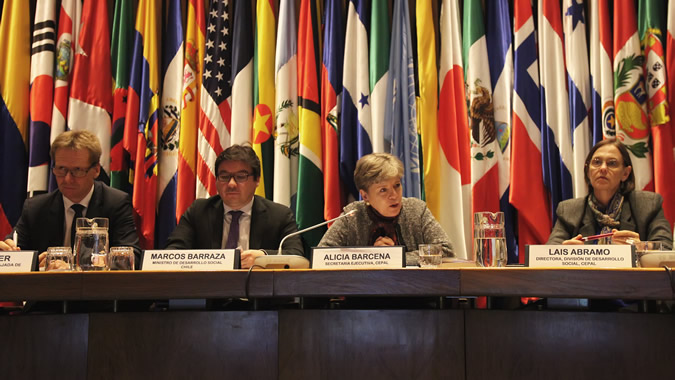Strengthening Social Institutionality is Fundamental for Achieving the Sustainable Development Goals
Work area(s)
Authorities and international specialists participate in a seminar inaugurated on Monday at ECLAC’s headquarters in Santiago, Chile.

Strengthening the institutional nature of social policies in a regional scenario of low economic growth is fundamental for avoiding backslides in poverty and inequality and for achieving the 2030 Agenda’s Sustainable Development Goals (SDGs), authorities and specialists agreed at a seminar on Social Protection and Institutionality: Current and Future Challenges to Inclusion in Latin America and the Caribbean, which is being held through Tuesday, August 29, in Santiago, Chile.
The opening remarks at the gathering – organized by the Economic Commission for Latin America and the Caribbean (ECLAC), with support from the German cooperation agency (GIZ) – were made by ECLAC’s Executive Secretary, Alicia Bárcena; Chilean Social Development Minister, Marcos Barraza; and Minister-Counselor from the German Embassy in Chile, Peter Sauer. The Director of ECLAC’s Social Development Division, Laís Abramo, also participated.
The international context is more complex than ever for following an ambitious and civilizing roadmap like the 2030 Agenda, Bárcena said, referring to increased questioning of multilateralism, the rise in global poverty and inequality, and the social and economic impacts of the fourth technological revolution that is under way.
“Not all social matters play out in social arenas. We have to also focus on productive and environmental issues. We need a comprehensive view of social policy and social institutionality to move toward achieving the 2030 Agenda, which aims to leave no one behind,” she stated.
ECLAC’s most senior representative added that “we cannot accept that there are women, men and children in conditions of poverty and vulnerability,” which means implementing a new generation of universal and sustainable social policies that address the challenges that people face over the course of their life cycle and in specific situations such as migration.
During his speech, Minister Barraza underscored the Chilean government’s efforts to broaden and strengthen the country’s social protection system with a focus on rights.
Among the concrete initiatives taken, the minister highlighted the educational reform (which includes the School Inclusion Law, the Teacher Statute and a progressive plan for higher education to be free of charge), an expansion in the illnesses covered by the System of Explicit Health Guarantees (AUGE), the strengthening of the “Chile Crece Contigo” (“Chile Grows with You”) program aimed at children, and a bill to reform the pension system.
Barraza also sustained that “the analysis of the social inequality matrix has been a fundamental contribution by ECLAC, serving as a reference for building and perfecting social protection systems in Latin America and the Caribbean.” He added that “thanks to that analysis, today we are more aware of the difficulties we face to build inclusive societies and of the adjustments needed in social protection systems to address very persistent factors that reproduce inequality and social exclusion.”
Peter Sauer, from the German Embassy, also praised “the importance of ECLAC as a strategic partner for Germany” in its commitment to support sustainable development processes in the countries of Latin America and the Caribbean. He made special note of the database on social institutionality developed by the Commission in the framework of its Cooperation Program with the German government (BMZ-GIZ).
At the seminar, the book Social Institutionality in Latin America and the Caribbean (Spanish only) was presented. This publication addresses issues such as the dimensions of social institutionality; regulation of the labor market and social protection; pension systems in Latin America; care as a pillar of social protection; youth institutions in the region; disability; and the public policies related to Afro-descendant Latin Americans, among others.
In addition to studying the progress made on the institutionalization of social policies in the region, seminar participants will analyze the challenges and opportunities represented by new technologies for social inclusion along with challenges related to migration.
The event’s conclusions will be presented at the Second Meeting of the Regional Conference on Social Development in Latin America and the Caribbean, a subsidiary body of ECLAC, which will take place on October 25-27, 2017 in Montevideo, Uruguay.
Related content

Protección social e institucionalidad en la región serán los ejes de seminario que tendrá lugar en la CEPAL
Representantes de gobierno y especialistas internacionales se reunirán en Santiago, Chile, los días 28 y 29 de agosto.
Subregional headquarter(s) and office(s)
National Office, MontevideoRelated link(s)
Country(ies)
- Latin America and the Caribbean
Related project(s)
Contact
Public Information Unit
- prensa@cepal.org
- (56 2) 2210 2040


